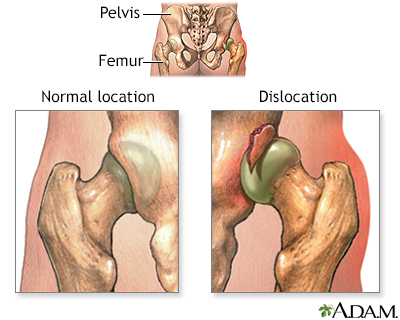Pregnancy SmartSiteTM
Joint dislocation DefinitionA dislocation is a disruption of the normal position of the ends of two or more bones where they meet at a joint. A joint is the place where two bones connect, which allows movement. A dislocated joint is a joint where the bones are no longer in their normal positions. ConsiderationsIt may be hard to tell a dislocated joint from a broken bone. Both are emergencies that need first aid treatment. Most dislocations can be treated in your health care provider's office or an emergency room. You may be given medicine to make you sleepy and to numb the area. Sometimes, general anesthesia that puts you into a deep sleep is needed. When treated early, most dislocations do not cause permanent injury. You should expect that:
Once a joint has been dislocated, it is more likely to happen again. After being treated in the emergency room, you should follow-up with an orthopedic surgeon (a bone and joint specialist). CausesDislocations are usually caused by a sudden impact to the joint. This usually occurs following a blow, fall, or other trauma. SymptomsA dislocated joint may be:
Nursemaid's elbow, or pulled elbow, is a partial dislocation that is common in toddlers. The main symptom is pain so that the child doesn't want to use the arm. This dislocation can be easily treated in your provider's office. First AidFirst aid steps to take:
Do Not
When to Contact a Medical ProfessionalCall 911 or the local emergency number right away if the person has any of the following:
PreventionTo help prevent injuries in children:
To help prevent dislocations in adults:
For all age groups:
ReferencesKlimke A, Furin M, Overberger R. Prehospital immobilization. In: Roberts JR, Custalow CB, Thomsen TW, eds. Roberts and Hedges' Clinical Procedures in Emergency Medicine and Acute Care. 7th ed. Philadelphia, PA: Elsevier; 2019:chap 46. Mascioli AA. Acute dislocations. In: Azar FM, Beaty JH, eds. Campbell's Operative Orthopaedics. 14th ed. Philadelphia, PA: Elsevier; 2021:chap 60. Naples RM, Ufberg JW. Management of common dislocations. In: Roberts JR, Custalow CB, Thomsen TW, eds. Roberts and Hedges' Clinical Procedures in Emergency Medicine and Acute Care. 7th ed. Philadelphia, PA: Elsevier; 2019:chap 49. | |
| |
Review Date: 6/17/2024 Reviewed By: C. Benjamin Ma, MD, Professor, Chief, Sports Medicine and Shoulder Service, UCSF Department of Orthopaedic Surgery, San Francisco, CA. Also reviewed by David C. Dugdale, MD, Medical Director, Brenda Conaway, Editorial Director, and the A.D.A.M. Editorial team. The information provided herein should not be used during any medical emergency or for the diagnosis or treatment of any medical condition. A licensed medical professional should be consulted for diagnosis and treatment of any and all medical conditions. Links to other sites are provided for information only -- they do not constitute endorsements of those other sites. No warranty of any kind, either expressed or implied, is made as to the accuracy, reliability, timeliness, or correctness of any translations made by a third-party service of the information provided herein into any other language. © 1997- A.D.A.M., a business unit of Ebix, Inc. Any duplication or distribution of the information contained herein is strictly prohibited. | |

 Radial head injury
Radial head injury Dislocation of the...
Dislocation of the... Shoulder joint
Shoulder joint
